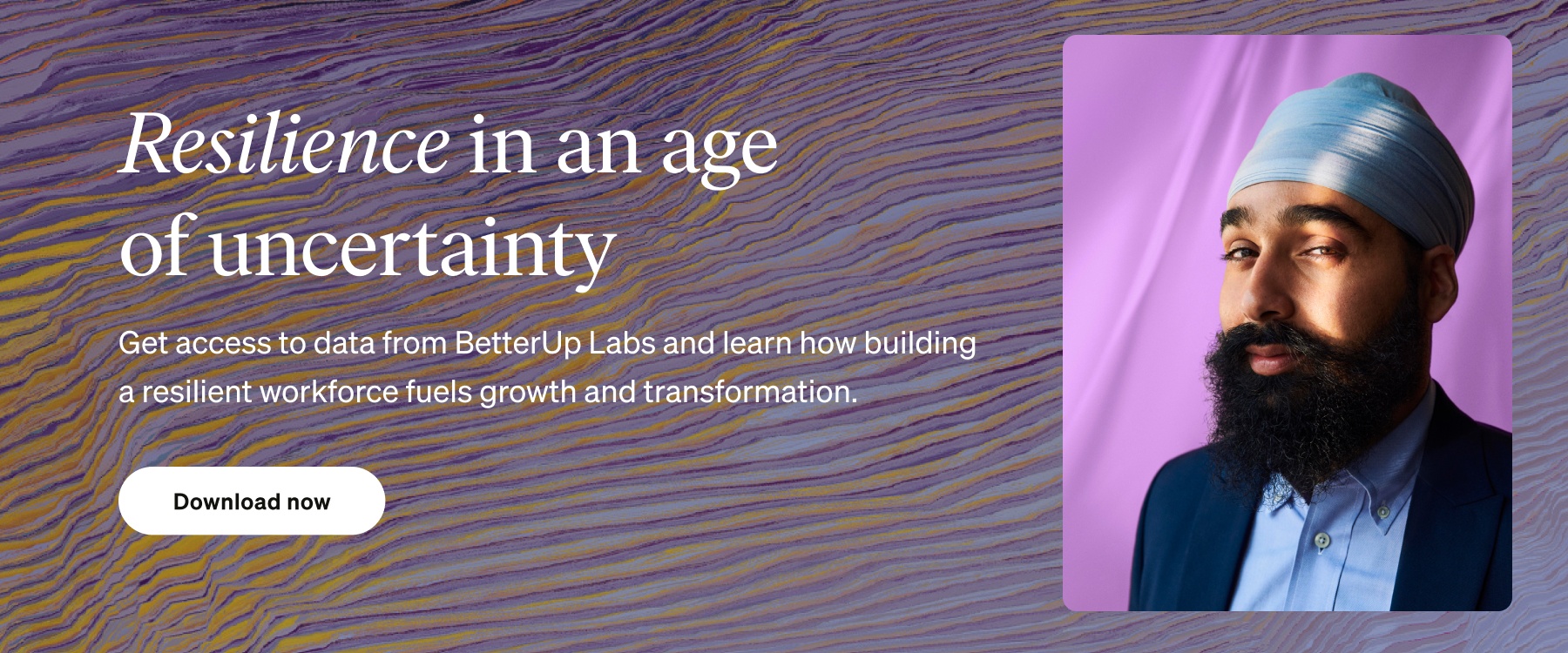-
For Business
For Business
Products
LeadBuild leaders that accelerate team performance and engagement.
Care™Drive productivity through sustained well-being and mental health for all employees with BetterUp Care™.
Solutions
Sales PerformanceTransform your business, starting with your sales leaders.
Diversity & InclusionFoster a culture of inclusion and belonging.
Customers
Case StudiesSee how innovative companies use BetterUp to build a thriving workforce.
- For Individuals
-
Resources
Resources
LibraryBest practices, research, and tools to fuel individual and business growth.
EventsView on-demand BetterUp events and learn about upcoming live discussions.
BlogThe latest insights and ideas for building a high-performing workplace.
ResearchInnovative research featured in peer-reviewed journals, press, and more.
- About
Perfect is the enemy of the good: 4 ways to thrive in ambiguity

Nothing’s better than perfect, right? Unfortunately, by definition, nothing is more unattainable, either. It’s tempting to strive for perfection when you’re working on a project you care about, but perfection can be the enemy of good if it keeps you from completing your work or making your goals a reality.
In addition, striving for perfection assumes that it is definable, knowable, and achievable. In many cases when the end-user is someone other than ourselves, we don’t actually know what perfection is. My “perfect” isn’t someone else’s. And, it will change by tomorrow.
The adage that “the perfect is the enemy of the good” has its roots in 18th-century literature, but its relevance has stood the test of time — and with good reason. Perfectionism is actually becoming more common.
A meta-analysis comparing rates of perfectionism across generations found that younger millennials and Gen Z are more likely to be hard on themselves. Moreover, they’re also more likely to think that other people are judging them harshly and, in turn, are far more demanding of others.
While it might seem like it’s helpful to hold yourself to a high standard, a harsh inner critic doesn’t benefit anyone. Self-criticism stops us in our tracks. Instead of helping us produce at that higher level, we often get less done and experience more stress.
How can we flip this idea of perfection on its head and learn to use it to our advantage? Understanding how to recognize when perfectionist tendencies are getting in our way is key. Let the phrase “perfect is the enemy of the good” become your new mantra as you improve your self-efficacy, productivity, and your ability to follow through.

Where did “perfect is the enemy of good” come from?
The phrase perfect is the enemy of good is often used to describe how people can get caught up in making things perfect and — as a result — never get anything done. The origins of the phrase are actually from a French proverb, which says l'ennemi du bien est le bien.
The saying is most commonly attributed to Voltaire, the famous French writer and activist. In his poem, La Bégueule, a character notes:
Dans ses écrits, un sage Italien,
Dit que le mieux est l'ennemi du bien.
What this means is that people who are striving for perfection are actually their own worst enemy. They're so busy trying to make everything perfect — looking for the best — they don't notice when progress might make a bigger difference than perfection.
The desire for perfection often prevents excellent work. We are all human beings with varying levels of competency when it comes to certain tasks, and the only way to do something perfectly is to do something that’s completely within your comfort zone. Striving for progress rather than perfection allows you the space to try, and — more importantly — to learn.
In tech, this phrase has become something of a battle cry. Startups and other organizations that depend on innovation to meet ever-changing customer needs in growing markets rally around the minimum viable product — the idea of getting “something” out to test assumptions and accelerate learning and progress.
These business leaders encourage their employees to let go of the idea of perfection and focus instead on getting things done. Speed isn’t the only thing, but speed matters. This approach helps to create a flow of ideas and a willingness to take risks.
The problem when perfect is the enemy of good
The pursuit of perfection can be detrimental in many ways. First, it can get in the way of performing and learning. If we're constantly striving for perfection, we're never going to give ourselves the opportunity to make mistakes and learn from them.
Second, it can damage relationships. When we're focused on perfection, we're less likely to be able to see the good in others and appreciate their imperfections. We become more judgmental of others, which reduces both collaboration and connection.
Third, it can lead to mental and physical health problems. Perfectionism can wreak havoc on your mental health. Perfectionist tendencies are a slippery slope to all-or-nothing thinking, which can have you completely throw in the towel when you feel like you can’t get something right.
Here are a few signs that perfectionism is getting in the way of progress, for yourself or a team member:
Signs that perfectionism is getting in the way
- You never feel satisfied or happy with your work
- You constantly compare yourself to others
- You often procrastinate tasks, even small ones
- You feel attached to your identity as a perfectionist, so you feel threatened when work isn’t “perfect”
- People close to you are frustrated with your drive for perfectionism
- You feel paralyzed by the choices and decisions you have to make in your work
- You avoid sharing your work with others
- You secretly (or not so secretly) believe “perfect” is the right answer — and are bothered by others’ willingness to compromise
- You struggle to articulate your expectations but often feel you or others fall short
- Your pursuit of perfection is causing you anxiety or depression

How to prevent perfect from getting in the way of good
If you deal with strong perfectionist tendencies, trying to confront them directly won’t be easy. In my experience, breaking these habits isn’t a light switch. It’s more like a pendulum. You swing from one extreme to the other — and the goal isn’t really to be on either side. With self-awareness (and a bit of unlearning) you find a way to slow it down and approach the middle.
If you’re “calibrated” to look for perfect, you’ll have to learn to hunt for evidence that challenges that thinking. Here are some ways to unlearn these tendencies and keep moving forward:
4 strategies to keep moving forward
- Concentrate on communication
- Strengthen your relationships through feedback
- Get comfortable with failure
- Understand the intent of an effort
1. Concentrate on communication
You don’t need to know everything. Often perfectionists are worried about revealing their shortcomings by making a mistake. But sharing your work as you go elevates the quality of the finished product, and keeps the other party informed of how they can help you.
2. Strengthen your relationships through feedback
Feedback helps to build trust between two parties. However, if your identity is wrapped up in being perfect, you’ll interpret that feedback as a threat. The more trust you build in your relationships — by sharing your work and being upfront about your challenges — the easier it will be to take risks going forward.
3. Get comfortable with failure
Moving quickly and growing often means risking failure. That’s okay. Redefine your understanding of what failure is — and don’t let it limit you. Set goals that are based on neutral factors within your control. You can’t make everyone love your work or make a client buy your product. But you can finish it on time, ask for feedback, make ten phone calls, or any number of other behaviors. Sometimes (often) done is better than perfect.
4. Understand the intent of an effort
Know what level of perfection is required in a task. Many efforts don’t require painstaking efforts or perfection to be valuable. Sometimes, simple and done is better than perfect and unfinished.
In some cases, working through ambiguity is part of the game. It’s not a reflection of your skills or effort. Getting clear about what isn’t knowable yet can free you up to just do your best — no matter what that looks like.
Thrive in ambiguity
The opposite of perfection isn’t failure. It’s a willingness to take risks, show up authentically, and learn to thrive amid ambiguity.
One of my mentors often says, “You can’t steer a parked car.” There’s nothing wrong with striving for absolute perfection — as long as you understand what it really means. Perfection isn’t an end in itself. It’s the lens through which you view a project to identify areas for improvement.
Avoid getting trapped in those details or your fear of failure. Sometimes, imperfect things are perfect as they are — especially when they provide the ability to learn and grow from them.
Allaya Cooks-Campbell
BetterUp Staff Writer






